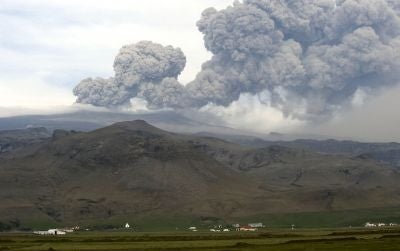Your support helps us to tell the story
From reproductive rights to climate change to Big Tech, The Independent is on the ground when the story is developing. Whether it's investigating the financials of Elon Musk's pro-Trump PAC or producing our latest documentary, 'The A Word', which shines a light on the American women fighting for reproductive rights, we know how important it is to parse out the facts from the messaging.
At such a critical moment in US history, we need reporters on the ground. Your donation allows us to keep sending journalists to speak to both sides of the story.
The Independent is trusted by Americans across the entire political spectrum. And unlike many other quality news outlets, we choose not to lock Americans out of our reporting and analysis with paywalls. We believe quality journalism should be available to everyone, paid for by those who can afford it.
Your support makes all the difference.The giant Icelandic volcanic ash cloud that caused aviation chaos in April was "just a training exercise" compared with the potential impact of a bigger eruption, an expert warned on Wednesday.
"Larger events are less frequent but they will occur," said volconologist Haraldur Sigurdsson, who was chairing a conference to discuss how to better coordinate the global response in the case of another eruption.
During its peak in the week after it began erupting on April 14, the Eyjafjoell volcano spewed enough ash to cause the biggest European airspace shutdown since World War II, affecting more than 100,000 flights and eight million passengers.
"This is what the earth is capable of and will do from time to time," Sigurdsson told scientists and airline industry experts gathered at the conference in Keflavik, southwest of the capital.
But that could have been "just a training exercise" compared to the impact of a bigger eruption, Sigurdsson cautioned.
Airline industry representatives called for a more co-ordinated response in the wake of the next eruption.
Nancy Graham, the director of the International Civil Aviation Organisation, said ash-induced shutdowns were a "global event that needed a global response".
Graham called for the development of scientific criteria by which to judge ash distribution and whether air space closure is necessary.
Gunther Matschingg, the senior vice-president for safety of the International Air Transport Association (IATA), criticised decision-making procedures during the shutdown.
"There were so many cooks cooking the broth, it was difficult to find out who was in charge, who makes the decisions. We were dealing with many institutions," he said.
"This was very difficult to manage. Individual states made decisions on flying zones," he said.
The shutdown cost the aviation industry worldwide approximately 1.7 billion dollars (1.3 billion euros), Daniel Cellaja, director of air transport of the European Commission, said.
Ulrich Schulte-Strayhaus of the Association of European Airlines (AEA), called for a "single European sky".
"We need clarifications, (to know) what is the role of each player," he said.
Matschingg said the London-based Volcanic Ash Advisory Centre, which assessed the threat level for Eurocontrol (the European Organisation for the Safety of Air Navigation, which in turn circulated information to national authorities), was too conservative.
"VAAC had a more of a risk averse approach (instead of focusing on) risk management control," he said.
"It is very clear that we need appropriate risk management. I hope it will turn out be less of a crisis next time," he said.
str-rdm/nl/cg

Join our commenting forum
Join thought-provoking conversations, follow other Independent readers and see their replies
Comments